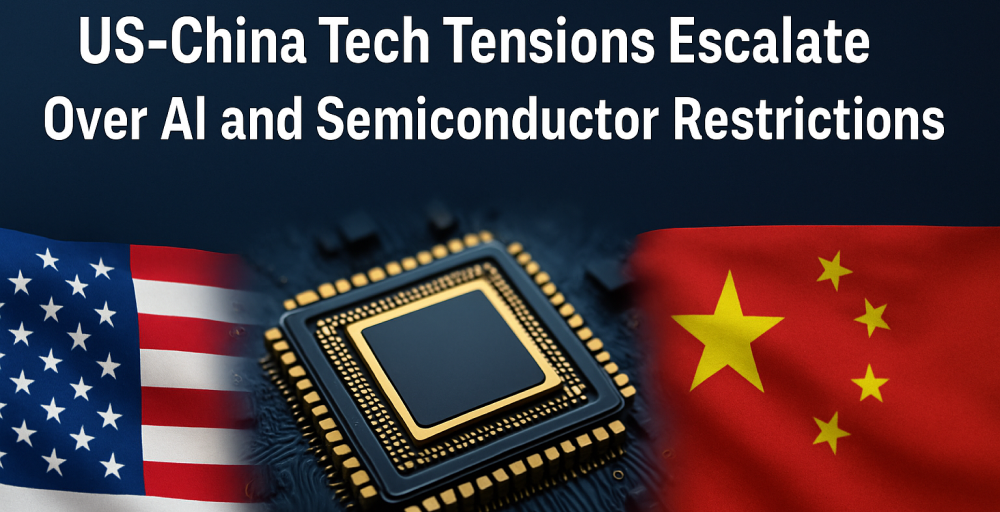2025-08-06
US-China Tech Tensions Escalate: What the Latest AI Chip Ban Means for the World
Introduction
Just when the world thought the tech rivalry between the United States and China had reached its peak, a new chapter has unfolded—and it's making waves globally. On August 5, the U.S. government officially imposed tighter restrictions on the export of advanced AI chips and semiconductor tools to China. This isn’t just a policy update—it’s a strategic move with far-reaching consequences that could reshape the future of global technology.
What Exactly Happened?
The U.S. Department of Commerce has updated its export control list to block the sale of AI-capable chips, even those with limited capabilities, to Chinese companies. These new restrictions are primarily aimed at curbing the flow of advanced technologies that could potentially be used in military or surveillance applications.
Earlier, companies like NVIDIA were able to ship less powerful versions of their AI chips (like the A800 and H800 models) to bypass export restrictions. But with the latest move, even those “lite” versions are now under the ban hammer.
“We are committed to protecting national security and ensuring sensitive technologies do not fall into the wrong hands,” a U.S. official stated during a press briefing.
China Isn’t Sitting Quietly
As expected, the Chinese government didn’t take this lightly. Officials from Beijing strongly criticized the U.S. action, calling it another example of "unjustified technological suppression." The Ministry of Commerce in China hinted that retaliatory steps are on the table, including restrictions on the export of rare earth minerals that are critical to chip manufacturing and green energy technologies.
Some Chinese analysts are already calling this the beginning of a new “tech cold war.”
“China won’t be held back by external pressure. We will accelerate our push for self-reliance,” said a spokesperson from China’s Ministry of Foreign Affairs.
Market Reaction: Not a Good Day for Tech Investors
It didn’t take long for the markets to respond. On Wall Street, shares of major semiconductor companies took a hit:
-
NVIDIA: Down 2.3%
-
AMD: Down 1.7%
-
Intel: Down 1.4%
-
TSMC (Taiwan): Slipped 1.2% in Asian trading
Investors are now worried about how much revenue companies will lose from restricted trade with China—a market that represents a significant portion of global chip sales.
Why This Matters Globally
This isn’t just a political story or a headline for investors. The implications go beyond borders:
-
Slower AI Development in China – China will likely face delays in AI training and deployment due to limited access to advanced chips.
-
Supply Chain Realignment – Companies might start shifting operations away from China or look for alternative tech hubs.
-
Higher Tech Prices – Smartphones, laptops, and other electronics could become more expensive if the cost of components rises.
-
Innovation Divide – We could be witnessing the beginning of a split tech ecosystem—one led by the U.S. and its allies, and the other by China.
Is This Just Politics?
Not entirely. While national security is the official reason, it’s clear that both nations are trying to dominate the next wave of technological revolutions—AI, quantum computing, robotics, and beyond. The United States wants to maintain its edge, while China is pushing hard to catch up and even surpass the West in certain areas.
This isn’t about who makes better phones anymore. It’s about who shapes the digital future.
What’s Next?
With this move, China is likely to speed up investments in its domestic chip industry. Reports already suggest that billions of dollars are being funneled into local AI and semiconductor firms. Meanwhile, the U.S. is also boosting domestic chip production under the CHIPS and Science Act.
It’s a race, and both sides are sprinting.
Final Thoughts
The U.S.-China tech rivalry is no longer just a trade issue—it’s a long-term strategic battle that touches everything from economics and security to innovation and global influence. While governments play their political chess, the ripple effects are being felt by businesses, developers, and consumers around the world.
We may not know who will win this race, but one thing is certain: the world of technology is changing faster than ever, and we’re all passengers on this wild ride.
Like this blog?
Follow our site for more insights on global affairs, technology, and how they shape our everyday lives.

